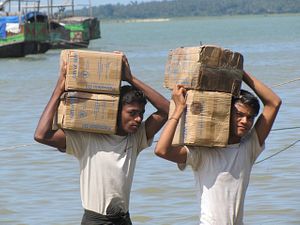With the world focused on thousands of people left stranded on board rickety fishing boats in waters that divide Southeast Asian countries, Myanmar’s courts turned their attention to the killing of journalist Aung Kyaw Naing, also known as Par Gyi.
According to the International Federation of Journalists and the South East Asia Journalists Union, the soldiers who allegedly shot Par Gyi were secretly acquitted of murder charges a week ago. His body was discovered in a shallow grave with a cracked skull and broken bones. He had been shot five times.
Par Gyi was arrested on September 30 while reporting on clashes between the military and the Democratic Karen Benevolent Army (DKBA), the IFJ said.
“The attempt to cover up his murder echoes similar methods that have been brought into play throughout the region, where critical media are often depicted as obstacles to progress or even ‘enemies of the state’.”
It and the SEAJU said the acquittal of the killers by the military court deserves the strongest condemnation and called for a robust, fair and transparent trial to reveal the full truth about Par Gyi’s death and end to the military’s culture of impunity.
The military had previously insisted he was working for the rebels and that they had shot him when he tried to escape.
“He was said to be returning from a DKBA-controlled area when he was detained and later brutally interrogated. However, Burmese Army claimed Par Gyi was shot when he allegedly tried to seize a gun from a guard and ran away,” the IFJ added.
Naypyidaw is under a harsh spotlight.
The Myanmar military and its government has failed to resolve its civil wars while persecution of ethnic Rohingya has forced them to flee their homes, however, their plight has until recent days been ignored by neighboring countries and the Association of Southeast Asian Nations (ASEAN).
Treatment of the press and political dissidents has the country’s detractors arguing, with some merit, that attempts to normalize relations with the West by easing restrictions on its citizens and opening-up its borders to business, are failing.
Last year Reporters without Borders ranked Myanmar in 145th spot on its World Press Freedom index, a slight improvement over recent years and reflective of some government reforms. The performance however, was still worse than 2002 when it ranked 137th.
Other countries within ASEAN, like the Philippines, also have atrocious records in protecting journalists who are simply doing their job. Much of the bloodshed is payback or meted out by thugs at the lower levels of society, like the Ampatuans of the Philippines.
But Myanmar stands out because of its hierarchal structure, with President Thein Sein and his generals, past and present, firmly in charge. This was evident in their decision not to attend a UN-backed regional conference on the Rohingya crisis slated for May 29.
It also raises issues about their expectations and international perceptions for Myanmar’s elections due to be held later this year which many had hoped would return this badly troubled country to full democracy.
Opposition leader and Nobel Peace Prize winner, Aung San Suu Kyi has again been notably quiet on the Rohingya issue despite launching herself onto an unofficial election campaign trail for her National League for Democracy.
“We have one simple belief. We should never break the promises that we have made to the people. I don’t want to say too many things. If I do and I can’t fulfill it later, I will be breaking my promise to the people,” she recently told supporters.
Cold comfort for the Rohingya who call Myanmar home. Sadly, the ethnic cleansing of Muslims from Myanmar’s Rakhine state is unlikely to abate and the intimidation of local journalists unlikely to stop, unless President Thein Sein and his military apparatus deem it so.
Luke Hunt can be followed on Twitter @lukeanthonyhunt

































